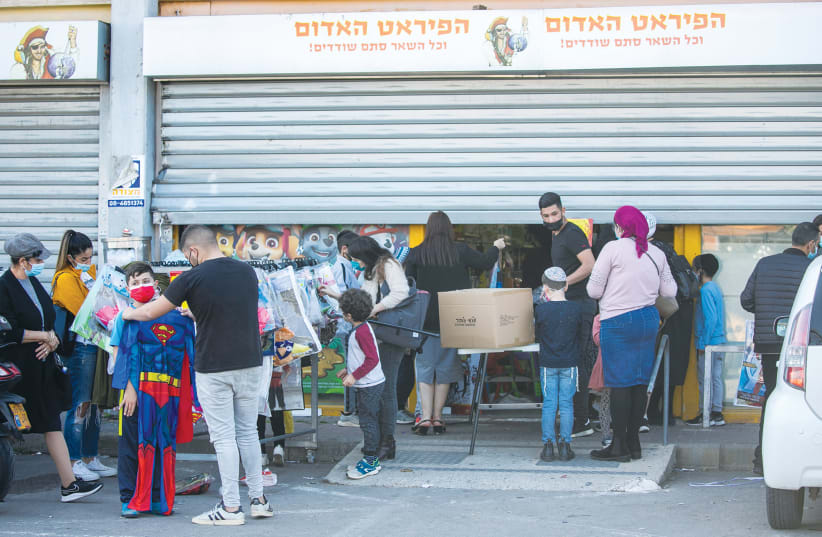Choosing costumes, baking goodies, preparing a seuda – a holiday meal for family and friends, are all part of the fun and festivity that is Purim.
But this year, this recent year, I’m not so sure.
Years from now, when we tell our children and grandchildren the story of Purim, we will tell them more than the story of beautiful Queen Esther and mean and awful Haman with his three-sided hat. We will tell them the story of the pandemic, our pandemic. Not the bubonic plague but the pandemic we lived through.
Purim is the anniversary of the COVID Plague. Purim is when COVID-19 hit. It hit the world. It hit Israel. It hit the Jewish community. It hit just around Purim last year. And nothing has been the same ever since.
There is not one person who has not felt the pain and suffered the losses the novel coronavirus has wreaked. There was loss of lives. Loss of income. Loss of family and community gatherings. Loss of everyday freedoms we always took for granted.
Last year we celebrated Purim. We celebrated in groups. We wanted to celebrate the holiday and we were mostly unaware of the dangers, the risk; the consequences that ended in the deaths.
And when Purim was over, the reality of what we had done, what we had naively done, struck.
This year – a full year later – many people are reaching the end of their tether. They have had enough of masks and social distancing. They want to be free again. They want to celebrate Purim the good old fashioned way. But it’s too soon.
This year, our Purim celebrations – just like all our celebrations, should be muted.
We live in a world where people are deceived by false messages and by the media. A world where some people rely more on Facebook and on pseudo-experts than on medical journals and science.
Yes, vaccines have been extremely successful but, despite the success, over the past three months almost half a million people have died from COVID-19 in the US. These past few months have been the most deadly months of the entire year with each month progressively worse than the previous month.
I am not a doomsayer. I think we will defeat COVID-19. But I think it is premature to believe that we have already beaten the beast. I think it will take more time than for what we originally had hoped. More time than we expected. So, what do we do about Purim?
For many families and communities, Purim is not just a day that happens once a year on the 14th day of Adar. Jewish history is replete with special Purims, personal holidays that were instituted to celebrate the day that these families or communities were saved from destruction.
Some were saved from natural disasters and some from human tyrants. Haman, if you will, has many forms and faces. For instance, In Padua, Italy, on the 11th day of Sivan in 1795, there was a major fire – and the Jewish community was saved.
In Tripoli, a False Purim, a Purim Kidebuni, is celebrated on the 24th day of Tevet. That’s because in 1705 the governor of then-Tunis laid siege to Tripoli and the Jewish community. But then, outside the city a plague broke. The siege was lifted and the governor and his army departed, saving the city and its people.
In 1524, Aḥmed Shaiṭan Pasha, governor of Egypt, imprisoned twelve leading Jews of Cairo. They were held for ransom. Among them was the chief rabbi, David ibn Abi Zimra. One day the governor pledged that he would massacre all the Jews in Cairo as soon as he finished taking his bath. While in the bath, one of his deputies stabbed and assassinated the governor. The Jews escaped a general massacre and the imprisoned Jewish leaders were released from prison on the 28th of Adar. This is known as the Purim of Cairo.
The Jews of Rhodes celebrate their special Purim the same day as traditional Purim, on the 14th of Adar. They celebrate a double Purim. In 1840, the governor of Rhodes decided to take revenge on the Jews because they were competing with Rhodes for the sponge trade. He claimed that Jews had kidnapped a Christian child and the Jews of Rhodes were imprisoned and tortured. When the child was found alive on the island of Syra, Sultan ‘Abd al-Majid deposed the governor of Rhodes and declared false the accusation of ritual murder.
I am not certain how we will celebrate the end of this plague. Unlike many of these special Purims, it will not end on a single day. I certainly hope that by next Purim we will be able to celebrate with family and friends. But life will never really return to normal. Our celebrations will always be a little dimmer than they once were, dimmed by the memory of those no longer here to share with us, those who were taken by this deadly plague.
